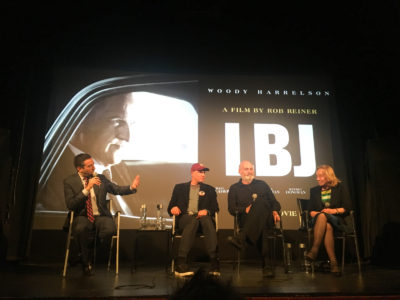
From the passage of the Civil Rights Act of 1964 to the decision to head into the Vietnam War, Lyndon B. Johnson’s presidency and legacy render him a “very complex, Shakespearean character,” according to Rob Reiner, director of the upcoming film “LBJ.”
On Wednesday night, Reiner, Woody Harrelson (who plays President Johnson) and Doris Kearns Goodwin, biographer and White House Fellow during Johnson’s presidency, gathered at the Brattle Theatre in Cambridge for a screening and discussion of “LBJ.”
The film details Johnson’s efforts as president to continue President John F. Kennedy’s legacy, specifically through the passage of the Civil Rights Act of 1964.
When MSNBC host and discussion moderator Ari Melber asked Reiner about capturing the essence of the 36th president in the film, Reiner said he wanted to hone in on the time in Johnson’s life when he was under the most pressure.
“The combination of insecurity that he felt of not being loved lead to a paralysis,” Reiner said during the discussion with the audience. “He’s gripped with fears and doubts and paralysis about how is he going to take on the mantel of being the president and how is he going to live up to this love of President Kennedy?”
With a time frame covering approximately two weeks of Johnson’s presidency — not including flashbacks — Reiner said the film is meant to capture both the president’s emotional depth and his legislative skill, which helped shape his commitment to the civil rights bill.
“He understood the mechanics of governing and the mechanics of getting things done,” Reiner said to the audience. “He wasn’t doing a ‘Mitch McConnell’ where he’s going to put something on the floor and have it fail — he was a consummate legislator and was more than happy to take on the mantel of being a Southerner so that he could court the Southern vote.”
Reiner said that Goodwin’s extensive knowledge and biography on Johnson gave him insight into who the late president was. Goodwin, who knew Johnson personally, told the audience that the man on screen was the man she knew, adding that it was “pretty eerie” to see him come to life again through Harrelson.
To prepare for the role and to understand who Johnson was as a person, Harrelson said he listened to tapes Johnson recorded of important conversations he had in the Oval Office.
“As a person, he was pretty fascinating — very funny, really driven, very persuasive, charismatic and also rageful,” Harrelson said in an interview with the Daily Free Press. “Thematically, it was that he cared about the civil rights issue and that he really tried to push that forward.”
“LBJ” presents a snapshot of the time period up until Johnson’s Civil Rights Act speech and, thus, does not cover part two of the bi-fold of Johnson’s legacy: the Vietnam War.
One audience member, Ken Rohr, 66, of Boxford, recalled the living through the war and the implications that surrounded it.
“I knew LBJ equally for his escalation of the Vietnam War, which I very much was against, and I also was well aware of his social contributions,” he said, citing the importance of recognizing Johnson’s role in accelerating the war.
The panelists also discussed the subject.
“It’s a tragedy and he was tortured by it,” Goodwin said during the panel, adding that Johnson deserves the responsibility for getting into the war.
Melber used Johnson’s guilt surrounding Vietnam to touch upon the accountability politicians feel for their actions in the modern political climate. He told audience members to leave that thought on the table when they think about upcoming conversations about “a president’s moral dimension.”
Throughout the night, panelists weaved in modern political conversation.
Reiner, a voice for liberal activism, name-dropped Jeff Sessions and Mitch McConnell before he said the film was made before Donald Trump was president.
Citing Trump’s claims that Barack Obama is not an American citizen, Reiner told the Daily Free Press that these remarks gave voice to the “virulent racism that has been in this country forever.”
“I’m hoping this is the last battle of the Civil War — it seems like we’re still fighting that battle of North and South,” Reiner told the Daily Free Press. “I’m hoping [‘LBJ’] will spur the kind of discussion that hopefully will propel us forward towards greater racial harmony, but it has value in that it keeps the discussion going.”














